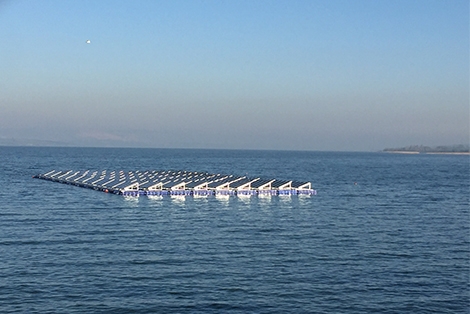

MICRO-SCALE MEASUREMENT-MODELLING BASED RESEARCH OF SOLAR ENERGY POTENTIAL AND APPLICATIONS IN ISTANBUL AND ITS SURROUNDINGS
Energy problem lies at the basis of environmental problems in the world. In order to prevent climate change and other environmental problems, renewable energies are the most important resources. In Türkiye, investments in hydroelectric and wind energies, which are renewable sources, have been realised for many years. Since recent years, investments in solar energy have started in the form of licence-requiring and non-licence-requiring investments.
One of the most prioritised and important phases in solar energy studies is to find a significant relationship by making measurements and then comparing with the determined models. In terms of solar energy, micro-scale studies of Istanbul city centre and its surroundings (water basins, protection zones, industrial zones, villages, etc.) have not been carried out and solar potential has not been verified. In micro-scale applications in terms of solar energy, meteorological variables such as cloudiness, dust, air quality, relative humidity, etc. as well as shading and topographical effects are of great importance. In order for the smart city concept to be established, detailed analyses of these variables, solar energy-based modelling and then the use of environmentally compatible energy sources are required. When Istanbul is considered, wind, solar, biomass, biomass, wave and current are at the top of these sources.
In this study, firstly, deployment of solar energy at micro-medium scale with various models (PVGIS, PVSOL, HOMER, RETSCREESN, etc.), efficiency analyses and losses are discussed in detail. In addition, Artificial Neural Networks (ANN), Genetic Algorithms (GA), Fuzzy Logic (FML), Geostatistical Methods (GE), Objective Analysis Methods (OAY) or numerical Medium Scale Dynamic Atmospheric Models (MM5, WRF etc.) are used for spatial or temporal transport and predictions. In addition, since satellite data provide highly accurate results in terms of solar radiation, these data are also investigated in detail. In the research, it is aimed to use the measurements at the points closest to the desired points, to move them, to obtain maps for the energy source, to perform error analyses and to make planning as a result. As a result of all these analyses, it is of great importance to select the photovoltaic (PV) types suitable for the area, to place them and to make efficiency analyses.
In this analysis process, it is of great importance that the risk calculations of PV systems in terms of shading, cloudiness, dust and relative humidity are made correctly.
In addition to all these, small/large scale applications of overwater floating or fixed PV systems in dam basins in Istanbul and its surroundings should be investigated and systems should be installed in real field conditions within the possibilities and efficiency analyses should be performed in detail together with environmental-atmospheric-hydrological-thermodynamic effects. Such applications and researches will be one of the firsts for Istanbul as well as our country.
The project has a unique value as it focuses on a specific region in and around Istanbul. In addition to this, the spatio-temporal use of various models and methods in the city and its surroundings provides the elimination of deficiencies in research and practice. In addition to all these, the contributions of solar energy to Istanbul as a green and smart city will be discussed in detail and on a micro scale axis. In addition, another planned topic is Floating Photovoltaic (HPV) systems. These systems, which have no application in our country, need to be installed on dams or ponds and investigated in detail.
The project team has been working on solar energy for many years and has contributed to many scientific studies. At the end of the project, detailed micro-scaled solar potential and applicability atlases of Istanbul will have emerged. In addition, detailed and experimental research of HPVs in the field will provide a great benefit for our country.
In the project, solar energy modelling will be carried out for the first time in micro scale in Istanbul and its surroundings. Within the framework of the project, examining the general behaviour of PV and HPVs, investigating their efficiency, the effects of HPVs on evaporation, system designs considering lake hydrology, designs and optimizations of components of floating systems, effects on water quality, production of HPVs under different meteorological conditions will be discussed.
Source : https://meteoenerji.com/